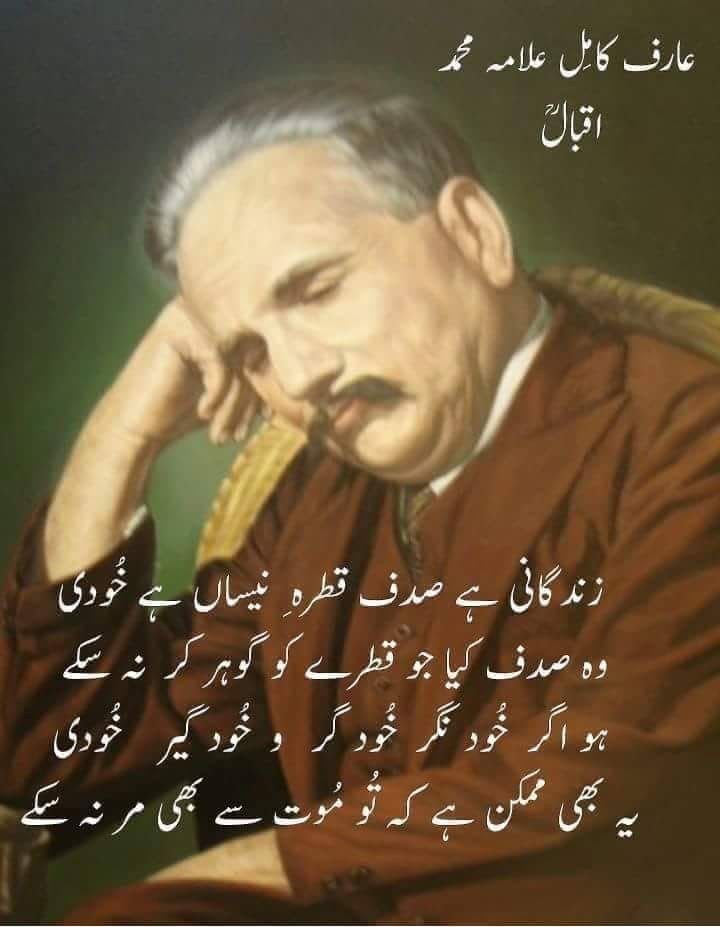Dr. Allama Iqbal: “Illuminating Power of Wisdom and Philosophy”.


Introduction:
Allama Iqbal was born on November 9, 1877, in Sialkot, Punjab Province, Pakistan. His forefathers were from Kashmir. His father’s name was Noor Muhammad and his Mother was Imam Bibi. She was also Kashmiri. His family migrated to Sialkot, Chorri Garhan Street now known as Iqbal Street.
Education:
He received his Basic Education at Home and then sent to Maktab-e-Meer Hassan. In 1888 he passed his primary school. In 1891 he received the Middle education. Matriculation in 1893. He completed his F.A. in 1895 from Murray College of Sialkot. In 1897 he studied Bachelor of Arts and attained the Degree of Master in Philosophy from Government College Lahore. His educational journey under Sir Thomas Arnold at Government College Lahore inspired him to pursue higher education in the West. With a scholarship to Trinity College, Cambridge, he earned a Bachelor of Arts in 1906 and became a barrister from Lincoln’s Inn. In 1907, he embarked on a doctoral pursuit in Germany, obtaining a Ph.D. from Ludwig Maximilian University, Munich, under Friedrich’s guidance.
Personal Life:
Allama Iqbal got married in 1893 to Kareem Bibi and was Blessed with a baby girl Mairaj Begham and a boy Aftab Iqbal.
His second marriage was in 1912 in His Kashmiri Family and that Lady’s name was Sardar Begham, by this lady, he was blessed with a son named Javed Iqbal and a daughter Muneera Iqbal.
Allama Iqbal got married thirdly in Ludhyana to Lady Mukhtar Begham.
Both wives, Sardar Begham and Mukhtar Begham always lived together like sisters.
The Great Allama Iqbal’s Literary Work:
Allama Iqbal, the renowned “Shair-e-Mushriq” (Poet of the East), holds esteemed titles like “Muffakir-e-Pakistan” (The Inceptor of Pakistan) and “Hakeem-ul-Ummat” (The Sage of the Ummah). In Iran and Afghanistan, he is celebrated as “Iqbāl-e Lāhorī” or “Iqbal of Lahore”, with his Persian works highly admired. The Pakistani Government honors him as the “National Poet”. His remarkable literary contributions include “Asrar-e-Khudi”, “Rumuz-i-Bekhudi”, “Payam-i-Mashriq”, “Zabur-i-Ajam”, “Bang-i-Dara”, “Bal-i-Jibril”, “Zarb-i Kalim”, “Armughan-e-Hijaz”, and “Pas che bayad kard”. Iqbal’s impactful lectures, later published as “The Reconstruction of Islamic Religious Thoughts in Islam,” have left a lasting legacy.
His family had a strong educational background, and his father was a respected religious scholar. He had a keen interest in literature, philosophy, and poetry from a young age, which laid the foundation for his remarkable journey as a poet and philosopher.
“Khudi ko kar buland itna, ke har taqdeer se pehle
Khuda bande se khud pooche, bata teri raza kya hai”
Translation:
“Elevate your selfhood to such heights, that before every destiny
God Himself asks the person, tell me what is your desire”
These lines encapsulate Iqbal’s philosophy of self-empowerment and the importance of realizing one’s true potential. They set the tone for the inspiring journey we’re about to embark on.
Highly Inspired by Mawlana Rumi (r.a):
Iqbal was greatly inspired by the poetry and philosophy of Mawlana Rumi. From a young age, Iqbal had a strong connection to religion. He delved deep into the study of Islam, the culture and history of Islamic civilization, and its future, with Rumi as his guiding light.
Rumi’s influence on Iqbal extended beyond poetry. Iqbal was deeply inspired by Rumi’s philosophy of love, spirituality, and the pursuit of inner transformation. He incorporated these themes into his own work, emphasizing the importance of self-discovery, connection with the Divine, and the potential for personal growth and societal change. Rumi’s teachings resonated with Iqbal’s vision of a revitalized Islamic civilization and his call for individuals to awaken their inner potential.

Role in Muslim Political Movement:
اٹھو مری دنیا کے غریبوں کو جگا دو
کاخ امرا کے در و دیوار ہلا دو
گرماؤ غلاموں کا لہو سوز یقیں سے
کنجشک فرومایہ کو شاہیں سے لڑا دو
سلطانی جمہور کا آتا ہے زمانہ
جو نقش کہن تم کو نظر آئے مٹا دو
جس کھیت سے دہقاں کو میسر نہیں روزی
اس کھیت کے ہر خوشۂ گندم کو جلا دو
کیوں خالق و مخلوق میں حائل رہیں پردے
پیران کلیسا کو کلیسا سے اٹھا دو
حق را بسجودے صنماں را بطوافے
بہتر ہے چراغ حرم و دیر بجھا دو
میں ناخوش و بے زار ہوں مرمر کی سلوں سے
میرے لیے مٹی کا حرم اور بنا دو
تہذیب نوی کار گہہ شیشہ گراں ہے
آداب جنوں شاعر مشرق کو سکھا دو
Iqbal played a significant role in the Muslim political movement. He was actively involved in the Muslim League and had close connections with leaders like Maulana Mohammad Ali and Muhammad Ali Jinnah. He criticized the Indian National Congress and was disappointed with the factional divides within the League. However, Iqbal believed that Jinnah was the leader who could unite Indian Muslims and fulfill the League’s objectives. Through their correspondence, Iqbal influenced Jinnah to return to India and lead the League.
His Legacy Continues to Inspire The World:
Allama Iqbal’s legacy continues to inspire people around the world. He passed away on April 21, 1938, in Lahore, Pakistan. His visionary ideas, poetic genius, and contributions to the Pakistan movement have left an indelible mark on history.
5 comments